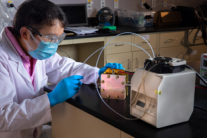Researchers at the University of Louisiana at Lafayette are helping to ensure that next-generation energy systems su
$1M federal grant boosts research to convert carbon dioxide into ethylene
Wed, 08/05/2020 - 9:21amThe U.S. Department of Energy has awarded an interdisciplinary team of researchers at the University of Louisiana at Lafayette a $1 million grant to develop a way to convert carbon dioxide into ethylene, one of the world’s most widely used chemicals.
The research has a potential environmental upside. The proposed technology being developed at UL Lafayette produces ethylene by breaking down carbon dioxide with low pulses of electricity. By comparison, steam cracking, the current method for producing ethylene, emits 200 percent more carbon dioxide, a greenhouse gas that’s a primary culprit in global climate change.
Dr. Xiao-Dong Zhou is executive director of UL Lafayette’s Institute for Materials Research and Innovation and the Stuller Endowed Chair of chemical engineering. He is heading the research team that secured the $1 million grant from the Energy Department’s Office of Fossil Energy, which awarded $17 million to 11 projects as part of its Carbon Utilization Program in June.
The federal program’s goal: to reduce emissions and transform waste carbon into value-added products. That’s his team’s goal, too, Zhou said.
About 140 million metric tons of ethylene are produced annually worldwide. It is the primary ingredient in polyethene, which is used to make plastic bags, bottles and food containers, among other everyday consumer products.
“Ethylene is an important chemical,” Zhou said. “But when you produce it at the industrial level, you also produce a lot of carbon dioxide.”
The UL Lafayette project “reverses the concept,” by using carbon dioxide to make ethylene, he explained. “If we can produce ethylene by using electricity coming from renewable resources, then we could, theoretically, reduce carbon dioxide production by 200 percent because we are not producing it. We are consuming it.
“We could produce ethylene while keeping the environment safe. It’s cost-effective and environmentally friendly.”
In addition to Zhou, UL Lafayette’s team consists of Dr. Dilip Depan, Dr. Tolga Karsili and Dr. Yu Wang. Depan is an assistant professor of chemical engineering, while Kasili and Wang are assistant professors of chemistry.
They are joined by research partner Dr. Jingjie Wu, an assistant professor of chemical engineering at the University of Cincinnati.
The $1 million federal grant to UL Lafayette will be supplemented by $250,000 in funding from both UL Lafayette and the University of Cincinnati.
The Energy Department also awarded 10 other research teams Carbon Utilization Program funding. Among the universities that received grants are the University of California Los Angeles, North Carolina State, and the universities of Delaware, Kentucky, Maryland, and Louisville.
Susteon Inc., a North Carolina-based private technology company, and the Gas Technology Institute, a nonprofit research and development organization located in Illinois, round out the list.
In a press release announcing funding, Under Secretary of Energy Mark W. Menezes said that “fossil fuels will continue to power our world well into the future. Therefore, it is our responsibility to ensure these fuels are utilized as cleanly and efficiently as possible.”
The Carbon Utilization Program “is investing in cutting-edge technologies to allow us to capture carbon oxides, which will reduce emissions, and then recycle them into economically valuable services like enhanced oil recovery or products like plastics and carbon fibers,” Menezes added.
Photo caption: Dr. Nengneng Xu, a postdoctoral fellow in UL Lafayette’s Institute for Materials Research and Innovation, demonstrates a prototype researchers are developing that produces ethylene by breaking down carbon dioxide with low pulses of electricity. (Photo credit: Doug Dugas / University of Louisiana at Lafayette)

